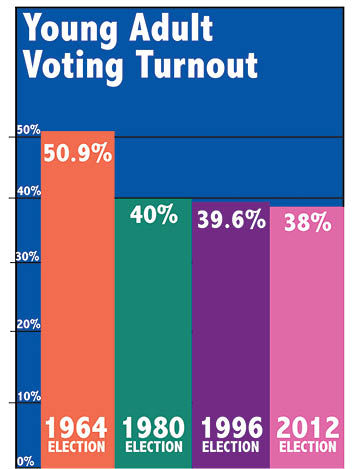Millenial voting turnout decline continues
February 21, 2016
While millennials are a large voting demographic, information from previous elections shows they do not use their strength in numbers.
In the 2012 presidential election, millennials accounted for over 21 percent of eligible voters in the U.S., but only 50 percent of those eligible voted, according to 2014 research in the article, “The Civic and Political Participation of Millennials.”
Midterm voting in 2014 for millennials was around 21 percent, or at least 9.9 million people, according to the Center for Information and Research on Civic Learning and Engagement.
A major reason most people do not vote is they feel they are not educated enough about the candidates, said Tim Collins, chair of the Department of Politics, Justice and Law.
“They don’t know how to get involved with it, and they don’t think that it does very much as a result,” he said. “The more you know about it, the more likely you are to get involved with it and to vote and make a difference.”
Senior Clay Oden said he did not vote in the 2012 national election because he felt his vote did not count.
“You can win the popular vote and someone else wins the election,” he said. “I already knew Alabama would (vote) republican, so if I voted Republican it wouldn’t matter, or if I voted Democrat, it wouldn’t matter. “
Another possible reason for low millennial turnout could be the perceived lack of supportable candidates, Collins said.
“When you get to the general election, it’s like the choices are already made,” he said. “So, (they feel they are) choosing between two evils, basically.”
Freshman Trinh Nguyenhe said she looks forward to voting in elections now that she has reached voting age.
“I think that if someone is good for (a country) and that they can win the election, I want the chance to vote for them,” she said.
Because millennials are usually either in school or beginning their careers, political issues might not have much bearing on their lives, Collins said.
“You typically don’t have a home or own a business, and so you don’t have things that are impacted by government as much in the same ways,” he said. “Now, student loans, certainly, that’s something that you can get excited about, or forgiveness of credit card debt. But, a lot of the issues don’t seem to touch on their daily lives.”
Millennials are generally a more opinionated demographic, and they want to see change, Collins said.
When they did not see the expected results and change with the Obama administration, millenials felt “alienated by the process,” Collins said.
Despite the lower number of young voters, politicians will still try to collect their votes, especially in the national election, he said.
“You’ll see Hillary Clinton dancing,” he said. ”You’ll see Bernie (Sanders) surrounded by young people chanting, ‘Feel the Bern’ or ‘Unicorns for Bernie.’ You’ll see young people supporting Donald Trump with enthusiasm.”
However, if millennials do increase their participation at the polls, it could have a “dramatic impact” on elections, Collins said.
“I don’t know if you can count on it going for the Democratic Party or the Republican Party, but I think it would change the types of things the candidates do,” he said. “It would probably change the slate of issues and the types of things they’re concerned about.”



![Caleb Crumpton [COURTESY OF UNA SGA]](https://theflorala.com/wp-content/uploads/2024/07/caleb-crumpton-courtesy-of-SGA-425x600.jpg)






